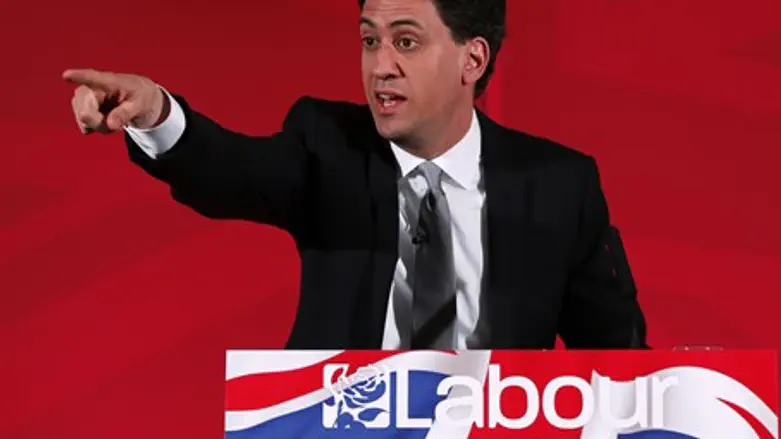
Written off as a weird Westminster insider who only became Labour Party leader by knifing his brother, Ed Miliband is now seen as having more than a sporting chance of being Britain's next prime minister.
Despite his awkward demeanor and frequent setbacks, the 45-year-old has retained an unerring self-confidence, which a growing number of people believe could propel him to the country's top job, as Britons head to the poll this week on May 7.
"I've been underestimated at every turn," he said in a fiery exchange with a fearsome interviewer, Jeremy Paxman, during a television grilling alongside Prime Minister David Cameron at the start of the campaign.
In sharp contrast to his often insipid performances against Cameron in parliament, Miliband has appeared energetic and enthused during recent campaign appearances, displaying an appetite for risk-taking.
He took part in a debate of opposition leaders, ignoring warnings he was on a hiding to nothing, and agreed to an interview with acid-tongued comedian Russell Brand, Britain's voice of anti-politics.
Miliband said the kitchen-table interview would make the campaign "more interesting" and he could yet have the last laugh if he manages to win over some of Brand's nine million Twitter followers - but it also earned him much derision among right-wing pundits.
And in a television appearance in which audience members criticized his party's record on public finances and pro-business policies, Miliband was on the defensive and stumbled as he left the stage.
He also appears to have been caught off-guard by the more dynamic style shown by Cameron in the dying days of the campaign following widespread criticism from both sides for a sterile run-up to Thursday's vote.
Healing rift
Notes that Miliband apparently left in the dressing room after one debate revealed that he had told himself to "relish the chance to show who I am" and present himself as a "happy warrior".
To his supporters, these tactics are now bearing fruit, and the turnaround has been remarkable since the time when his popularity rating sank to a low of minus 55 in November and rumours of a leadership coup.
But to his critics the change has been more evidence of Miliband's stage-managed persona.
The Financial Times last week said that being on his campaign "has the whiff of a western tourist's experience of Pyongyang", and journalists have complained of being hissed and heckled by hand-picked audiences when asking probing questions.
His old-fashioned left-wing beliefs have also attracted criticism - the right-wing media branding him "Red Ed" - as has his record on banking deregulation while working at the Treasury in the years before the financial crash of 2008.
Perhaps most damaging, however, is the family rift that the fiercely ambitious Miliband created by taking on and beating his older brother David, a protege of former prime minister Tony Blair, for the Labour party leadership in 2010.
Ed said recently that the fraternal divisions are now "healing".
His biographers Mehdi Hasan and James Macintyre said it was seen by some "as an almost biblical act of fratricide".
His brother left to work in the United States shortly after the defeat, but recently tweeted a picture of his postal vote with the hashtag "Ed4PM".
Miliband's trade union backing, lack of experience outside Westminster and rhetoric against multinationals have caused concern in the country's boardrooms - as reflected in an open letter signed by 100 executives during the campaign.
Miliband says he is standing up to the rich and powerful on behalf of Britons left struggling after years of austerity.
But the media reports have highlighted his multi-million-pound home, inheritance-tax arrangements and political privilege as examples of hypocrisy.
His opposition to a referendum on European Union membership, however, has support in the business community, as do his pledges to help smaller companies.
Steely backstabber?
The son of a prominent Marxist academic father and a campaigning activist mother, Miliband grew up in a highly politicized household where he took part from an early age in dinner parties attended by left-wing intellectuals from around the world.
He is married to a successful environmental lawyer, Justine Thornton, and they have two young sons.
His immigrant parents, both Jewish, lost many family members in the Holocaust; if elected, he would by the United Kingdom's second-ever Jewish-born prime minister, after Anglican convert Benjamin Disraeli.
But despite his Jewish roots, Miliband and his party are deeply unpopular with British Jews for an increasingly aggressive stance towards Israel, as well as several controversies over anti-Semitism.
A recent poll indicated that the vast majority of Britain's 250,000 or so Jews would be voting for the center-rights Conservative Party led by Prime Minister David Cameron.
But his party is more popular among the UK's roughly three million-strong Muslim community.
"Despite the setbacks he has suffered, he never despairs. He is steely," said Iain Begg, a politics professor at the London School of Economics.
"After all, he stabbed his brother in the back to take over the leadership of the Labour party. Not everyone could do that."
AFP contributed to this report.